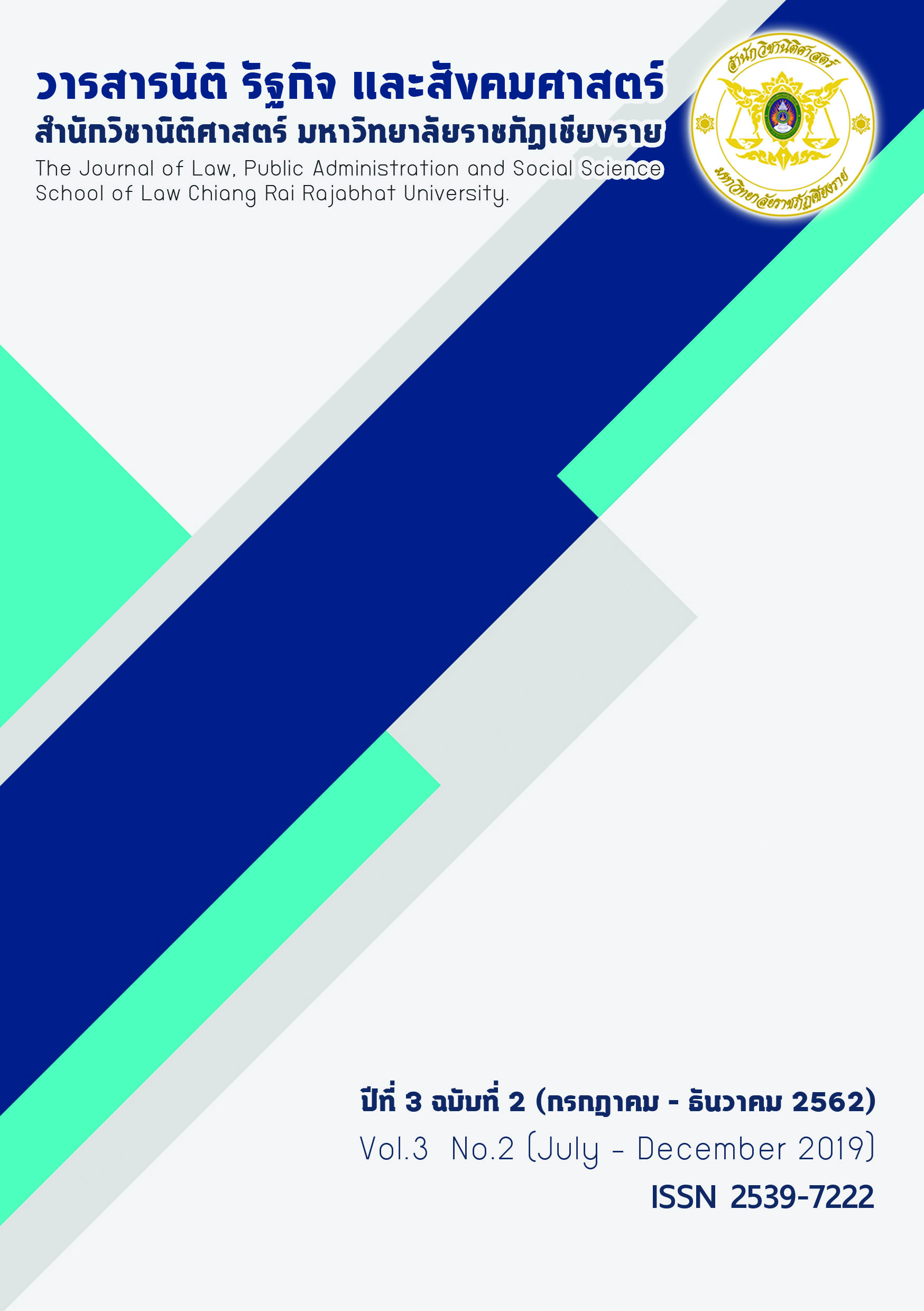Flower-Dessert of Tai-Lue's Culture (Phayao): Legal Model for Restoration and Conservation of Biological Resources for Local Community
Main Article Content
Abstract
This model initiative shows a step for restoration, conservation, and sustainable use of local biological resource based on local participation with legal and cultural tools of Tai-Lue community (Phayao). It is an example of applying sustainable development principles into practice relating to the Biodiversity Convention 1992 and the United Nations Sustainable Development Goals. This research is an integrative work by analyzing quantitative and qualitative results based on eco-feminism and eco-cultural concept. The research uses the culture of making the flower dessert, which is Tai Lue traditional knowledge, as an example of research. Five steps need to be taken: (1) to empower the green-attitude to community based public participation (2) to foster ecological literacy (3) to promote green technology (4) to increase a ratio of female community’s member (5) to encourage the role of law for environmental movement, and also it suggests appropriate legal tools
Article Details
References
ทัดจันทร์ เกตุสิงห์สร้อย. (2554). การวิเคราะห์สถานภาพและบทบาทแม่ในนวนิยาย “ลับแล,แก่งคอย, ปริญญาโท มหาบัณฑิต, การค้นคว้าอิสระ คณะอักษรศาสตรมหาบัณฑิตมหาวิทยาลัยศิลปากร.
ธิติ ไวกวี. (2560). การบริหารจัดการสัตว์ป่าด้วยหลักพันธสัญญาเชิงนิเวศ, รวมเล่มคัดย่อ การประชุมทางวิชาการพะเยาวิจัยครั้งที่ 6 “ศิลปวัฒนธรรมวิจัยเพื่อประเทศไทย 4.0” วันที่ 26-27 มกราคม 2560 ณ หอประชุมพญางาเมือง มหาวิทยาลัยพะเยา, กองบริหารงานวิจัยและประกันคุณภาพการศึกษา มหาวิทยาลัยพะเยา, หน้า 1674-1689.
ปิยะมาศ ใจไฝ่. (2560). แนวคิดอทวิลักษณ์ของสตรีนิยมเชิงนิเวศในล้านนา, วารสารปณิธาน, 13(2), 42-57.
พระราชบัญญัติคุ้มครองสิ่งบ่งชี้ทางภูมิศาสตร์ พ.ศ. 2546.
พระราชบัญญัติเครื่องหมายการค้า พ.ศ. 2534.
พระราชบัญญัติส่งเสริมและรักษามรดกภูมิปัญญาทางวัฒนธรรม พ.ศ. 2559.
ราณี หัสสรังสี. (2561). สตรีนิเวศนิยม (Ecofeminism) กับความเคลื่อนไหวในสังคมไทย. กรุงเทพฯ: บริษัท นัชชาวัตน์ จำกัด.
วรมาศ ธัญภัทรกุล. (2561). ผู้หญิง ธรรมชาติ และการหายไปของ “แม่” กับมุมมองสตรีนิยมสายนิเวศในนวนิยายเรื่อง Solar Storm ของลินดา โฮแกน. วารสารมนุษยศาสตร์, 25(1), 79-103.
สุจิตต์ วงษ์เทศ. (2559). วัฒนธรรมร่วม อุษาคเนย์ในอาเซียน. กรุงเทพฯ: สำนักพิมพ์นาตาแฮก.
อนุกูล ตันสุพล. (2559). นิเวศวิทยาวัฒนธรรม : กุญแจสู่การพัฒนาที่ยั่งยืน. วารสารวิชาการ คณะมนุษยศาสตร์และสังคมศาสตร์, 12(1), 193-221.
Bosselmann Klaus. (2016). Sustainability (2 edition). London: Routledge.
Carson Rachel. (1962). Silent Spring. Cambridge: Riverside Press.
Garrity-Bond Cynthia. (2018). Ecofeminist Epistemology in Vandana Shiva’s The Feminine Principle of Prakriti and Ivone Gebara’s Trinitarian Cosmology. Feminist Theology, 26(2), 185-194.
Shiva Vanada. (2014). Ecofeminism. London: ZED BOOKS.


